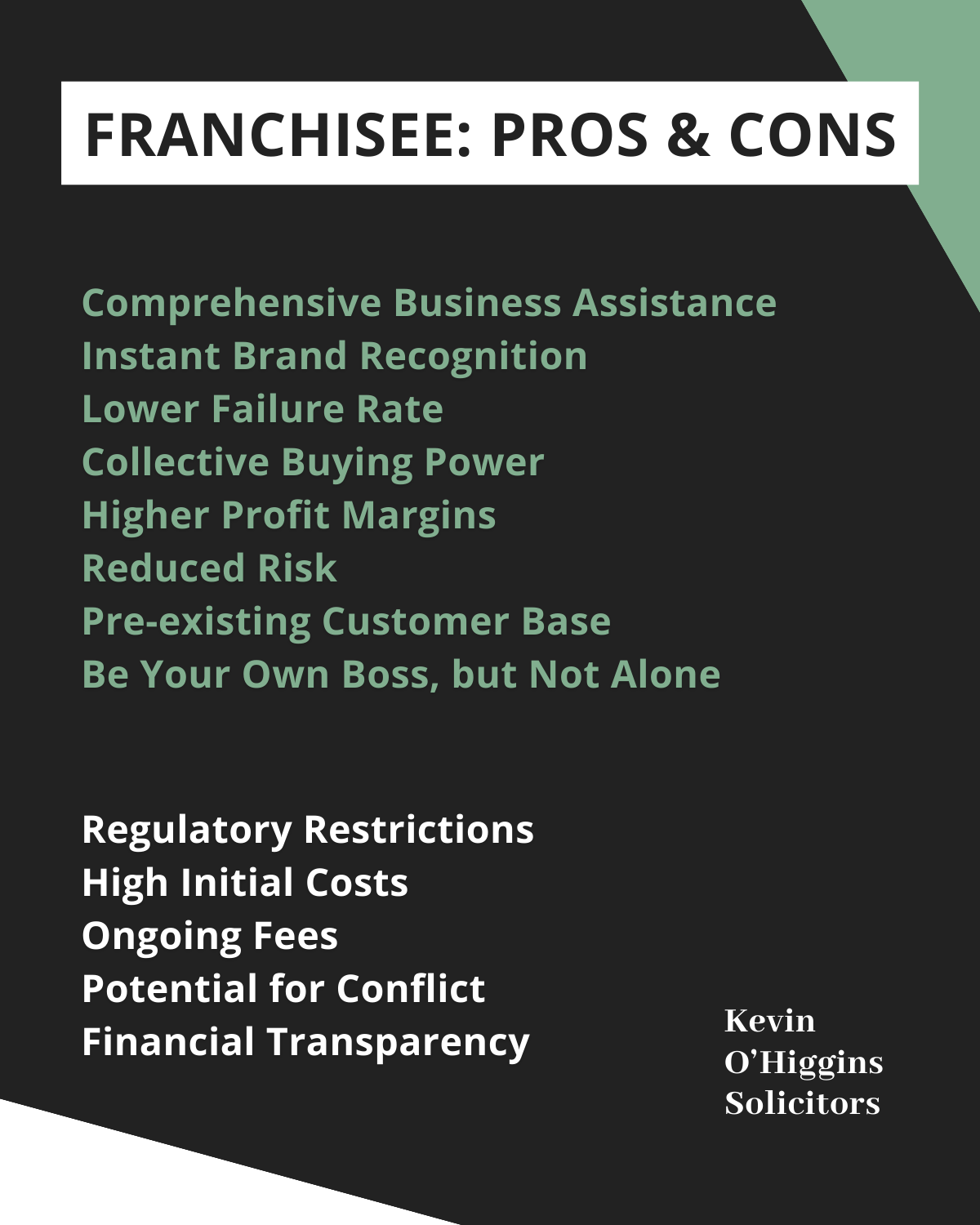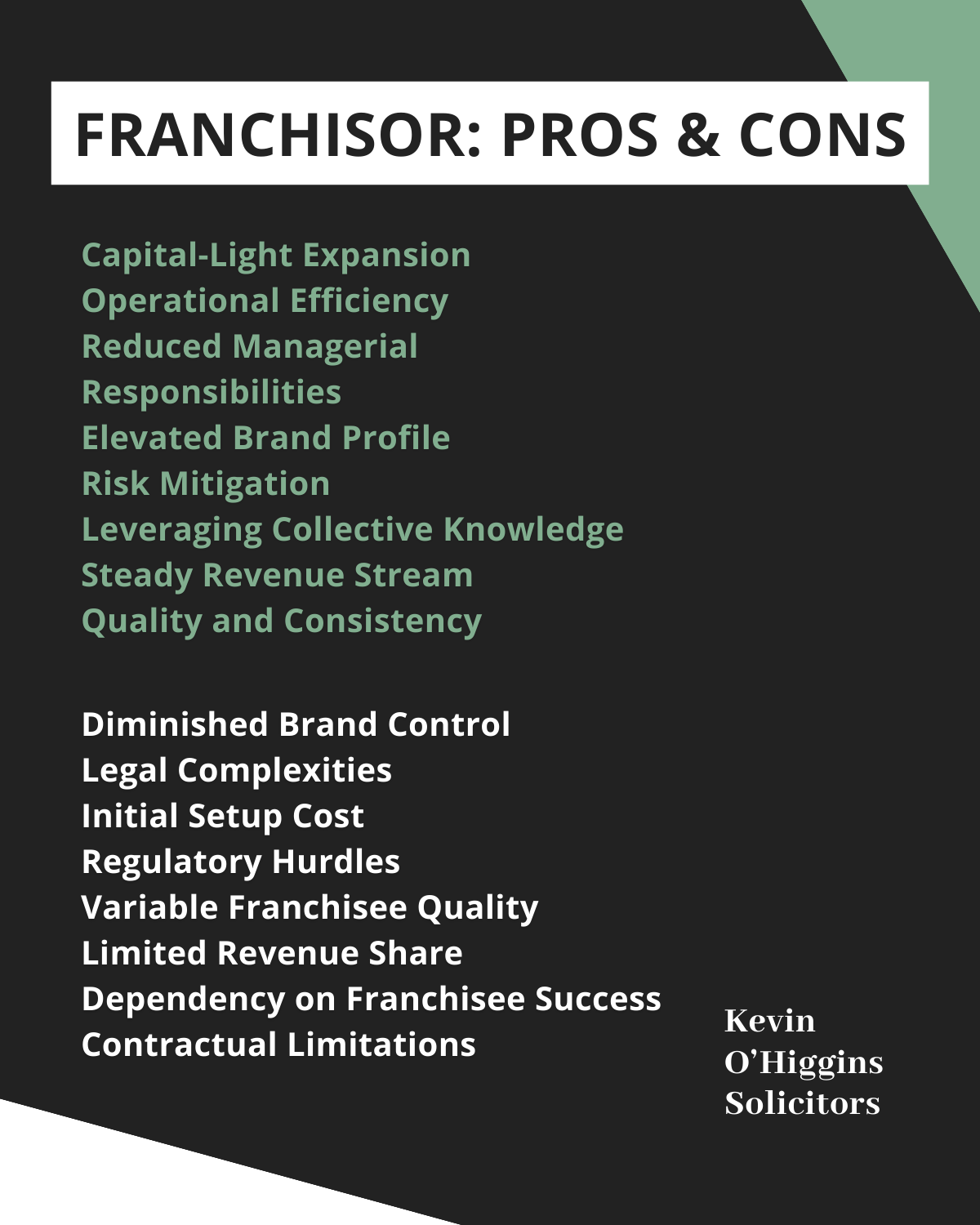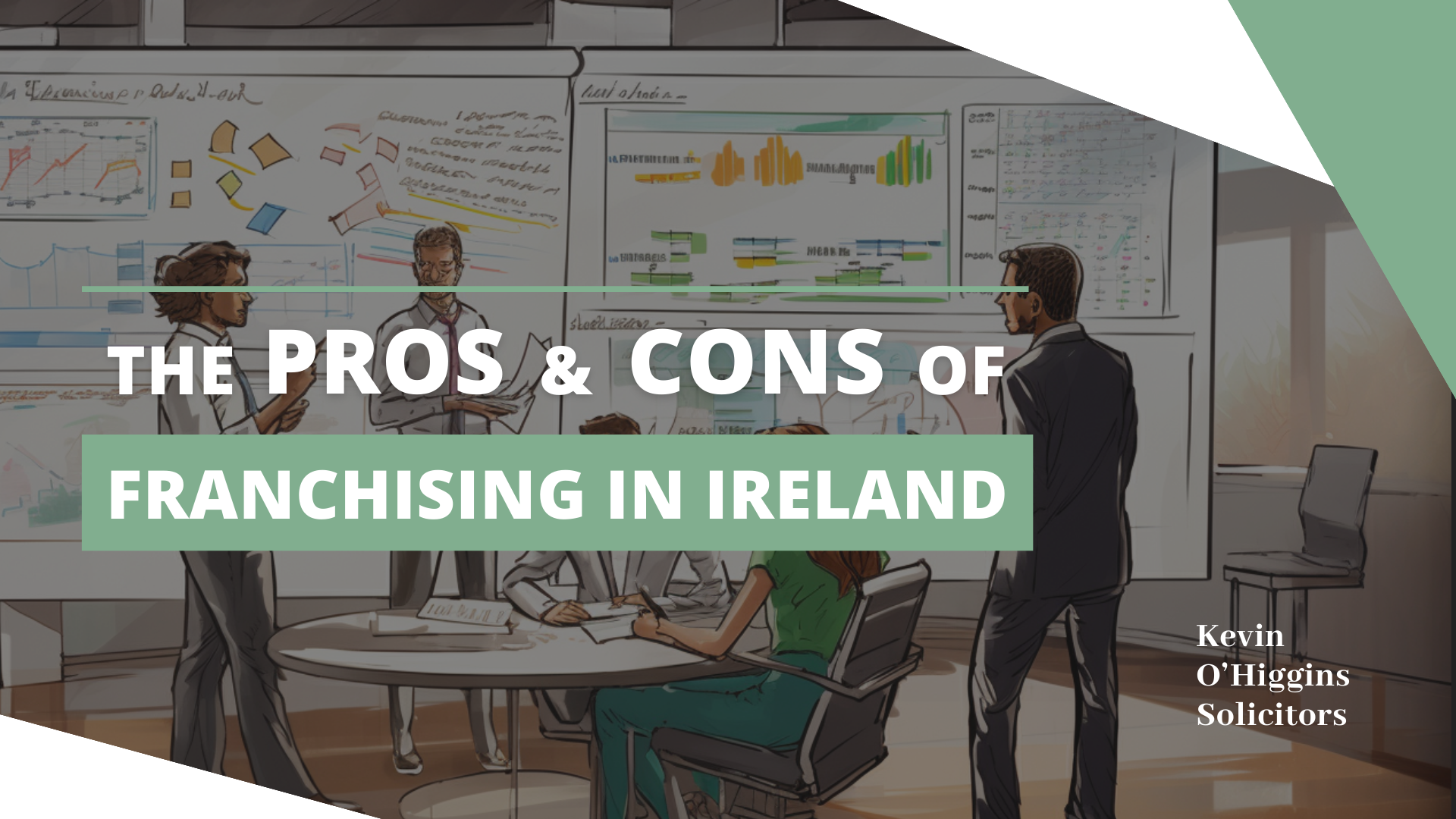
How to Create a Franchise Agreement in Ireland
Introduction
Franchising offers a promising path to business expansion in Ireland, where entrepreneurs can leverage established brands to build their ventures. The foundation of any successful franchise lies in a well-crafted franchise agreement.
This legal document outlines the duties, rights, and expectations of both the franchisor and the franchisee. Crafting this agreement with precision is crucial, not only to comply with Irish and European Union laws but also to ensure both parties engage in a profitable and sustainable partnership.
In Ireland, franchising continues to grow, reflecting a vibrant economy and a welcoming environment for business innovations. However, navigating the complexities of franchise laws and regulations can be daunting. This article aims to simplify the process, providing you with clear and actionable steps to create a robust franchise agreement.
Whether you’re a seasoned business owner or a new entrepreneur, understanding the intricacies of franchise agreements is essential. This guide will walk you through everything from the basic legal considerations to the detailed clauses that should be included in your agreement. Let’s start this journey towards securing your business future in franchising.

The Legal Framework of Franchising in Ireland
Understanding the legal landscape is the first step in drafting a franchise agreement.
In Ireland, franchise operations are not governed by specific franchise laws but fall under general commercial laws and regulations that affect contracts, businesses, and intellectual property. Compliance with these laws ensures that your franchise operates smoothly and avoids legal pitfalls.
Key Legal Considerations
Franchise agreements in Ireland must adhere to several legal frameworks, including the Sale of Goods and Supply of Services Act, Consumer Protection Act, and Competition Law. These laws ensure that both parties engage fairly, preventing any practices that might distort competition or exploit consumers. Moreover, since Ireland is a member of the European Union, franchisors must also consider EU regulations, particularly those concerning antitrust and competition.
Common Legal Pitfalls
Many new franchisors fall into the trap of vague or incomplete agreements, which can lead to disputes or legal challenges. A common issue arises with non-compliance with disclosure obligations, where franchisors fail to provide full and transparent disclosures to potential franchisees before the agreement is signed. Another significant pitfall is the failure to register trademarks, which can lead to intellectual property disputes down the line.
Understanding these legal basics is crucial for anyone looking to franchise a business in Ireland. Ensuring compliance with both national and European regulations can save you from costly legal battles and help maintain a healthy business relationship between franchisor and franchisee.

Preparing to Draft a Franchise Agreement
Before diving into the specifics of drafting a franchise agreement, it’s essential to prepare thoroughly. This preparation not only ensures that the agreement complies with legal standards but also aligns with your business goals and the franchise model you envision.
Understanding the Business Model
Start by clearly defining the franchise model. What will be the roles of the franchisor and the franchisee? How will the branding be handled? What are the expectations regarding marketing and sales? Answering these questions will help shape the agreement to suit the specific needs of both parties. It’s essential to align these elements with the overarching goals of your franchise system to promote growth and consistency across locations.
Role of Due Diligence
Conducting due diligence is critical. For franchisors, this means verifying the financial stability and market reputation of potential franchisees. For franchisees, it involves a thorough analysis of the franchisor’s business model, financial health, and the legal soundness of their offer. Due diligence helps prevent future conflicts by ensuring both parties have a clear understanding of what to expect and are capable of fulfilling their obligations.
Setting Clear Goals and Objectives
Both parties should have a clear understanding of what they wish to achieve through their partnership. This includes financial objectives, expansion goals, and operational targets. Setting these goals beforehand helps in drafting an agreement that reflects the aspirations and limits of both the franchisor and the franchisee. It also aids in maintaining transparency, which is crucial for a long-lasting business relationship.
Preparing thoroughly for your franchise agreement lays the groundwork for a successful franchise operation. By understanding the business model, performing due diligence, and setting clear goals, you are better equipped to create an agreement that not only protects your legal rights but also promotes a prosperous business relationship.

Key Components of a Franchise Agreement
Drafting a franchise agreement involves several critical components that define the relationship between the franchisor and the franchisee. Ensuring these components are clearly articulated and legally sound is paramount for a successful franchise partnership.
Defining Terms and Conditions
The agreement should start with a clear definition of terms to avoid ambiguities. This includes the roles and responsibilities of both the franchisor and franchisee, the duration of the agreement, renewal terms, and the conditions under which the agreement can be terminated. Also, it should outline the initial and ongoing financial commitments required from the franchisee, such as upfront fees, royalties, and advertising contributions.
Rights and Responsibilities
Detailing the rights and responsibilities of each party is essential. This includes the franchisor’s obligation to provide training, support, and operational manuals, and the franchisee’s duty to adhere to the franchisor’s operational guidelines and sales targets. These responsibilities should be laid out in detail to ensure both parties are aware of what is expected of them and to reduce the potential for disputes.
Financial Terms
The agreement must explicitly state all financial arrangements, including the initial franchise fee, ongoing royalty payments, marketing fees, and any other costs associated with the franchise. It’s crucial to specify payment terms and conditions to ensure there are no misunderstandings about financial obligations.
Intellectual Property Rights
Protecting the franchisor’s brand and intellectual property is critical. The agreement should specify how the franchisee can use the franchisor’s trademarks, copyrights, and proprietary information. It should also clarify that all intellectual property rights remain with the franchisor and that the franchisee has a licence to use these assets in a manner prescribed in the agreement.
Territory Rights and Exclusivity
The franchise agreement should define the territory in which the franchisee can operate and whether they have exclusive rights to that territory. This section prevents other franchisees or even the franchisor from opening competing outlets within the specified area, thereby protecting the franchisee’s investment.
These key components form the backbone of a franchise agreement. By defining these elements clearly and comprehensively, you can ensure that the franchise relationship is built on a solid legal foundation, minimising the risk of future conflicts and enhancing the prospects for long-term success.

Operational Guidelines and Standards
In a franchise system, maintaining consistency in operations and branding across all locations is vital. The franchise agreement should include comprehensive guidelines and standards that ensure this consistency while allowing enough flexibility for local adjustments if necessary.
Setting Operational Standards
The agreement should specify the operational standards that all franchise locations must meet. This includes customer service protocols, product or service quality standards, and store layout and design guidelines. By maintaining high and uniform standards, the franchise ensures a consistent brand experience for customers, which is crucial for the brand’s reputation and the success of the franchisees.
Compliance with Regulations
Franchisees are required to comply with local, national, and international laws and regulations. This includes health and safety standards, employment laws, and any specific industry regulations that apply to the business.
The franchise agreement should outline the franchisee’s responsibilities in maintaining compliance and the consequences of failing to do so. This protects both the franchisee and the franchisor from legal repercussions and helps maintain the integrity of the franchise.
Quality Control Measures
To ensure that all franchisees meet the brand’s standards, the franchise agreement should include provisions for regular quality control inspections and audits.
These measures help to identify any deviations from the set standards and provide an opportunity to address them promptly. It’s also beneficial to outline the support the franchisor will provide to help franchisees meet these standards, such as training, regular updates to operational manuals, and access to approved suppliers.
These operational guidelines and standards are designed to uphold the quality and uniformity that customers expect from the franchise brand. They are critical not only for the protection of the brand’s reputation but also for the success of the franchisees by ensuring they provide a reliable and quality service or product.

Dispute Resolution and Termination Policies
In franchising, as in any business relationship, conflicts may arise, and circumstances may change, necessitating clear procedures for dispute resolution and termination of the agreement. This section of the franchise agreement is critical for protecting both parties and ensuring that any transitions or disputes are handled smoothly.
Dispute Resolution Procedures
The agreement should outline specific methods for resolving disputes between the franchisor and franchisee. This often includes a step-by-step process starting with negotiation and, if necessary, moving to mediation or arbitration.
Specifying these procedures in advance helps prevent disputes from escalating and ensures that they are resolved in a fair and predetermined manner.
It’s also important to state the governing law and jurisdiction that will apply to the resolution of disputes, which should generally align with the franchisor’s base of operations or another mutually agreed-upon location.
Termination Conditions
Termination policies are essential for detailing under what conditions either party can terminate the agreement. This includes breaches of contract, failure to meet financial obligations or other significant issues like bankruptcy or criminal activity.
The agreement should also outline the notice period required for termination and the process for winding down operations, including the handling of outstanding financial matters and the return of proprietary materials and equipment.
Exit Strategies and Transfer of Rights
In addition to termination conditions, the franchise agreement should address potential exit strategies for the franchisee. This could include selling the franchise back to the franchisor, transferring it to another qualified buyer, or other exit scenarios.
Clear guidelines on how these processes are to be handled ensure that transitions occur smoothly without disrupting the franchise system or damaging the brand.
These policies are vital for managing the end of a franchise relationship, whether it concludes naturally, through mutual agreement, or due to unforeseen circumstances. They protect the interests of both the franchisor and franchisee, ensuring that the closure or transfer of the franchise is handled professionally and equitably.

Finalising and Reviewing the Agreement
The final stages of creating a franchise agreement involve careful review and adjustments to ensure that all aspects of the agreement are legally sound and align with both parties’ objectives. This part of the process is crucial to prevent future legal issues and to ensure that the agreement serves the interests of both the franchisor and franchisee effectively.
Importance of Professional Reviews
Before finalising the franchise agreement, it is critical to have it reviewed by legal professionals. A solicitor who specialises in company law can provide valuable insights and identify any potential legal vulnerabilities in the agreement.
This review ensures that the agreement complies with local and international laws, including those governing contracts, competition, and trademarks. Legal experts can also help tailor the agreement to any specific needs or circumstances of the franchisor and franchisee, adding an extra layer of customisation and protection.
Negotiating the Final Details
Once the agreement has been drafted and reviewed, the next step is negotiation. This phase involves both parties discussing any concerns they might have and requesting adjustments.
Effective negotiation requires transparency and good communication, ensuring that both the franchisor and franchisee feel confident about their roles and responsibilities as outlined in the agreement. It’s important that this stage is approached as a collaborative effort to build a strong foundation for the business relationship.
Documentation and Signatures
After negotiations are complete, the final agreement should be prepared for signatures. This involves ensuring that all the changes agreed upon during negotiations are correctly reflected in the document. The signing of the agreement should be conducted formally, with both parties understanding the full implications of the contract. It is also advisable to have witnesses present during the signing to validate the process.
Once signed, it’s important for both parties to keep copies of the agreement in a safe place, as they may need to refer to them in the future. Regular reviews and updates of the agreement may also be necessary to adapt to any changes in the business environment or in the laws that affect franchising.

Conclusion
Creating a franchise agreement in Ireland is a detailed and meticulous process, but it is essential for the success and sustainability of any franchise operation.
A well-crafted agreement not only ensures compliance with legal standards but also establishes a clear and mutually beneficial relationship between the franchisor and the franchisee.
Recap of Key Points:
- Understanding the Legal Framework: Knowing the laws that govern franchising in Ireland, including national and EU regulations, is fundamental. This knowledge helps prevent legal pitfalls and ensures smooth operation.
- Preparation Steps: Thorough preparation, including defining the business model, conducting due diligence, and setting clear goals, is crucial for drafting an effective agreement.
- Key Components of the Agreement: A comprehensive franchise agreement should detail the terms and conditions, rights and responsibilities, financial arrangements, intellectual property rights, and territory rights.
- Operational Guidelines and Standards: Maintaining consistency in operations and compliance with regulations is essential for protecting the brand and ensuring the success of the franchise.
- Dispute Resolution and Termination Policies: Clear procedures for resolving disputes and conditions for terminating the agreement protect both parties and ensure that any transitions or conflicts are managed effectively.
- Finalising and Reviewing the Agreement: Professional legal reviews and careful negotiation are vital for finalising an agreement that is legally sound and satisfactory to both parties.
Drafting a franchise agreement is not a task to be taken lightly. Given the complexities involved, seeking professional legal advice is strongly recommended. Legal experts can help tailor the agreement to your specific needs, ensuring compliance with all relevant laws and protecting your interests.
By following the steps outlined in this guide, you can create a robust and comprehensive franchise agreement that lays the groundwork for a successful franchise business. Remember, a solid franchise agreement is the cornerstone of a thriving franchise operation, providing clarity, protection, and a clear path to success for both the franchisor and the franchisee.
If you are unsure whether franchising is the right business model for you, take a look at our guide on the Pros and Cons of Franchising in Ireland.

Frequently Asked Questions
What are the most important legal aspects to consider when creating a franchise agreement in Ireland?
The most important legal aspects include compliance with the Sale of Goods and Supply of Services Act, Consumer Protection Act, and Competition Law, as well as EU regulations concerning competition and intellectual property.
How often should a franchise agreement be reviewed or updated?
Franchise agreements should be reviewed regularly, at least annually, to ensure they remain compliant with current laws and reflect any changes in the business environment or the franchise relationship.
What common mistakes should be avoided in drafting a franchise agreement?
Common mistakes include vague terms, inadequate disclosure, failure to protect intellectual property, and not specifying dispute resolution procedures. Avoiding these errors can prevent future conflicts and legal issues.
What should be included in the operational guidelines of a franchise agreement?
Operational guidelines should include customer service standards, product quality requirements, store layout and design specifications, and compliance with health and safety regulations.
How can disputes between franchisors and franchisees be resolved effectively?
Effective dispute resolution involves clearly defined procedures in the agreement, starting with negotiation, followed by mediation or arbitration if necessary. Specifying the governing law and jurisdiction for resolving disputes is also crucial.
What are the termination conditions in a franchise agreement?
Termination conditions include breaches of contract, failure to meet financial obligations, bankruptcy, or criminal activity. The agreement should also outline the notice period and procedures for winding down operations.
By addressing these questions and following the comprehensive steps outlined in this guide, you can create a franchise agreement that supports a successful and sustainable franchise business in Ireland. If you have further questions or need assistance, contact Kevin O’Higgins Solicitors today.




![KOHS | Franchising In Ireland Franchisees run the day-to-day operaations while franchisors focus on broader managment and strategic planning | Kevin O'Higgins Solicitors]](https://ohigginssolicitors.ie/wp-content/uploads/2023/09/KOHS-blog-2-2.png)




